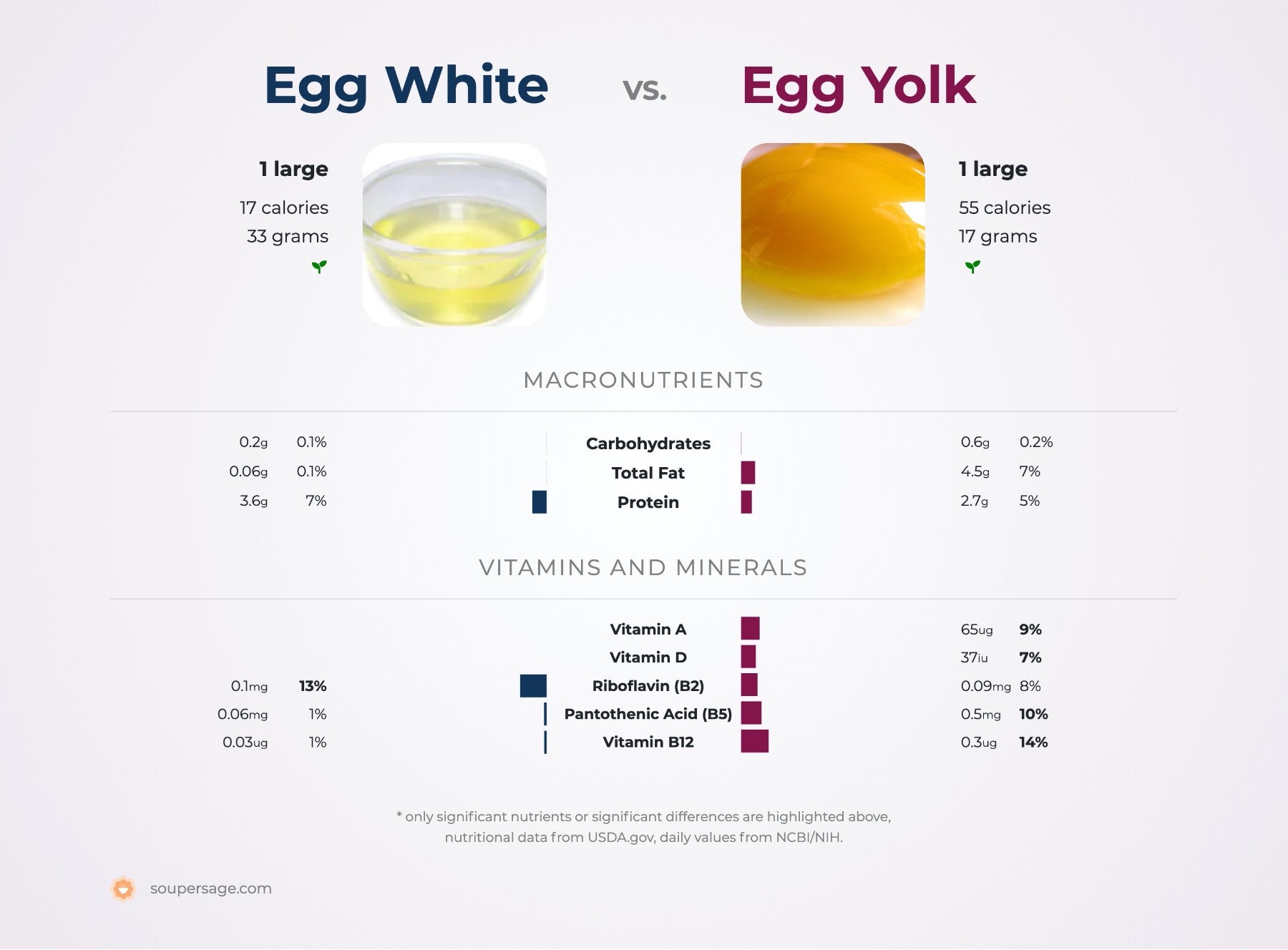Egg whites are low in calories, carbohydrates, fat, and cholesterol while being rich in protein. They contain fewer micronutrients than whole eggs.
Whole eggs provide a variety of beneficial nutrients that may support brain health, blood lipid profiles, and body composition.
However, nutrients are not evenly split between an egg’s components — the yolk and the white differ substantially in their nutritional content. That means whether you eat the whole egg or only the white will change the nutrient profile you receive.
Continue reading to explore the nutrition of egg whites and how they compare with whole eggs.

Nutrition facts of egg whites and whole eggs
Egg whites are the transparent, viscous liquid encircling the yellow yolk.
In a fertilized egg they serve as a protective barrier against pathogens and supply some nutrients for embryonic development.
Most of an egg’s vitamins, minerals, and lipids are located in the yolk, whereas egg whites consist mostly of water and about 10% protein.
If you discard the yolk and eat only the white, the egg’s nutritional value shifts substantially.
The table below outlines the nutrient differences between the white of a large egg (34 grams [g]) and a whole egg (50.3 g).
The Daily Values (DV) are shown as percentages (%) and were calculated using DV benchmarks from the USDA:
Egg white Whole egg
Calories 1 74 Protein 3.6 g 6.2 g
Fat 0 g 5 g Cholesterol 0% 69%
Vitamin A 0% 10% Vitamin B1 20% 21%
Vitamin B2 11% 16% Vitamin D 0% 8%
Choline 0% 31% Selenium 8% 28%
An egg white supplies fewer calories and micronutrients compared with a whole egg, and it also contains less total protein and virtually no fat.
Low in calories but high in protein
Studies indicate that egg proteins are distributed across the egg’s parts to a reasonable degree.
Still, egg whites deliver a much higher protein-to-calorie ratio than whole eggs, since they are protein-dense and low in energy.
For example, if you ate the same number of calories in egg whites as found in one whole egg (74 calories), you would consume nearly 15 g of protein versus about 6.2 g from the whole egg.
Ensuring adequate protein intake matters because protein has numerous roles in preserving the structure, function, and health of organs and muscles.
Research shows that a higher-protein diet may help with weight management and body composition, offering benefits like:
- increased lean muscle mass
- lower body fat levels
- greater satiety
- reduced appetite
- improved gut health
- prevention of bone loss in older adults
Because egg whites are rich in protein, they can help boost your protein intake without adding many calories.
Egg whites also supply a “complete” protein, meaning they contain all nine essential amino acids in the proportions your body needs for optimal function.
Low in fat and free of cholesterol
Eggs were once a controversial food due to saturated fat and cholesterol concerns, with some experts suggesting they might elevate cardiovascular risk.
All of an egg’s cholesterol and most of its fat are located in the yolk. Egg whites are nearly pure protein and contain no fat or cholesterol.
For many years that made egg whites appear the healthier option versus whole eggs. However, subsequent studies have demonstrated the potential benefits of consuming eggs and shown that dietary cholesterol from eggs is not problematic for most people.
That said, a subset of individuals — known as “hyper-responders” — do experience increased blood cholesterol after eating dietary cholesterol.
Hyper-responders may carry genes, such as APoE4, that predispose them to elevated cholesterol. For those people or for individuals already with high cholesterol, egg whites might be the preferable option.
Potential risks
Egg whites are generally safe for most people, but they are not without potential downsides.
Allergies
Although egg whites are safe for the majority, egg allergy can occur.
Some studies suggest many egg allergens are present in the white rather than the yolk.
Egg allergies are more common in children, though around half of affected children outgrow the allergy by age 3.
Salmonella food poisoning
Raw eggs and raw egg whites carry a risk of Salmonella infection, according to food safety authorities.
Salmonella can be inside the egg or on the shell, although modern hygiene and farming practices reduce this risk. Cooking egg whites until firm greatly lowers the chance of contamination.
Reduced biotin absorption
Raw egg whites can also interfere with absorption of the water-soluble vitamin biotin, which is important for energy metabolism.
Raw whites contain the protein avidin, which binds biotin and impairs its uptake.
However, causing a biotin deficiency would require consuming large quantities of raw egg whites. Once egg whites are cooked, avidin loses this effect.
Egg whites vs whole eggs: Which should you eat?
Egg whites are rich in protein yet low in calories, fat, and cholesterol.
That makes them a useful option if you want to meet a low-calorie target while preserving muscle, reducing hunger, and supporting energy needs.
Still, egg whites provide far fewer vitamins and minerals than whole eggs.
Whole eggs are among the most nutrient-dense foods available. They deliver a broad spectrum of vitamins, minerals, and beneficial fats that may offer anti-inflammatory, anticancer, antioxidant, and immune-supporting actions, among other effects.
To gain the advantages of both, consider combining egg whites with whole eggs — this increases protein content while keeping calories relatively low.
Frequently asked questions
Are two egg whites a day enough protein?
No. Two egg whites yield just over 7 g of protein. The Dietary Reference Intake recommends adult men consume at least 56 g of protein per day and adult women about 46 g.
Can I eat 10 egg whites per day?
Yes, you can consume 10 egg whites in a day. However, varying your protein sources between lean animal and plant foods will supply a broader array of nutrients.
Are egg whites healthier than the yolk?
Egg whites were traditionally viewed as healthier because they are lower in calories, fat, and cholesterol. Yet research indicates egg yolks are nutritious and contain most of an egg’s vitamins and minerals and other beneficial compounds.
The bottom line
Egg whites are a protein-dense, low-calorie choice that can help you increase protein intake without adding many calories.
However, whole eggs offer substantially more beneficial nutrients.
Eating both can help you maximize the benefits of each.























Leave a Reply
You must be logged in to post a comment.